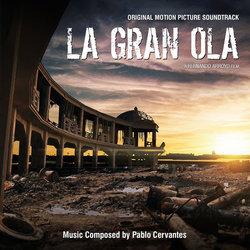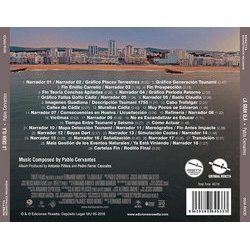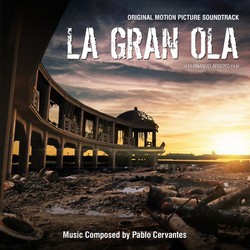La Gran Ola
Stay better informed and get access to collectors info!
| # | Track | Duration | |
|---|---|---|---|
| 1. | Narrador | ||
| 2. | Gráfico generación tsunami | ||
| 3. | Fin Emilio Carreño/ Narrador 03 | ||
| 4. | Fin prospección | ||
| 5. | Fin teoría conchas apiladas | ||
| 6. | Narrador 04/ Gráfico período retorno | ||
| 7. | Gráfico fallas Golfo Cádiz/Narrador 05 | ||
| 8. | Narrador 05/Baelo Claudia | ||
| 9. | Imágenes Guadina/Descripcion tsunami | ||
| 10. | Cabo Trafalgar | ||
| 11. | Calles de Cádiz | ||
| 12. | Murallas Cádiz | ||
| 13. | Muy pocos se salvaron | ||
| 14. | Narrador 07/Consecuencias en Huelva/Licuefaccion | ||
| 15. | Refineria/Narrador 08 | ||
| 16. | Victimas | ||
| 17. | Narrador 09 | ||
| 18. | No es escandalizar es educar | ||
| 19. | Tiempo entre tsunami y seísmo | ||
| 20. | Como actuar | ||
| 21. | Narrador 10/Mapa detención tsunami/ Narrador 11/Mareografos/Fin antes impacte | ||
| 22. | Narrador 12/Bollas Dart | ||
| 23. | Narrador 13/Simulacion costas/Narrador 14 | ||
| 24. | Narrador 15 | ||
| 25. | Narrador 16/Señalizacion | ||
| 26. | Narrador 17 | ||
| 27. | Transicion | ||
| 28. | Mala gestión de los eventos natuarales/Ya está viniendo/Narrador 18 | ||
| 29. | Cartelas fin/Rodillo fina |
La Gran Ola
Added on Tuesday, March 06, 2018
Pablo Cervantes is known for being José Luis Garci’s last period composer, but, since
his cinematographic music debut in 2000 with You’re the one until Holmes & Watson:
Madrid Days in 2012, he has developed his own career, diversifying between fiction
TV series, documentaries and, obviously, other cinematographic productions.
As the films shows, the catastrophe has already happened in the past. Given the subject’s
seriousness, Cervantes chooses a tense, suspenseful soundtrack, linking one statement
to the next, and highlighted by aerial shots taken by drones, reason why some of the
music tracks are so short. That’s not the case in the initial one, more than six minutes
long, where Cervantes uses minimalist forms, creating a disturbing atmosphere based
on electronic sounds. That way, he intertwines the prologue, crafted through a summary
of successive repetitions, the film’s main titles and the narrator’s explanation on
the tectonic plates’ movements and their unpredictable, yet evident, activity. The composer
creates the soundtrack from these criteria, as the different bodies of evidence
are presented. The composer adds a Mediterranean touch to his work, obvious despite
its shortness, in Generation Tsunami, the album’s second track, simulating through
samplers the Arabian lute and the guitar. Cape Trafalgar and Victims are examples of
the mix between the threatening, suggestive electronic sounds and the more organic
ones created with the samplers. The synthetised percussion`s counterpoint in Streets
of Cádiz and Walls of Cádiz shows the ominous reality that what happened then could
happen again any time, something crystal clear in Very few escaped. The tense rhythm
goes in crescendo as narrator and interviewees show the possible consequences of
disregarding the voices of alert. They emphasise prevention (It’s not about shocking,
it’s about educating, How to act), warning of the situation people could face due to A
poor management of natural events. Arroyo, with Cervantes’ complicity, ends the film
with a stunning, hair-raising simulation of the disaster, which would be less effective
with good (in)formation. Great educative music.





